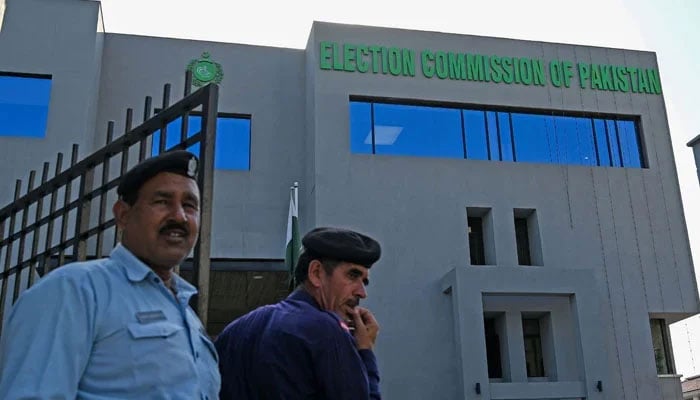ECP finds its functions severely hurt by SC order in SIC case
ECP has found that commission’s duties and functions are directly and adversely affected by judgment
ISLAMABAD: Election Commission of Pakistan (ECP) believes that the Supreme Court’s (SC) recent judgment in Sunni Ittehad Council vs ECP case has not only severely eroded commission’s constitutional role but also rendered meaningless relevant articles of the constitution and provisions of Election Act 2017.
Informed sources said that the ECP in its internal discussions on the SC’s judgment, has found that the commission’s duties and functions are directly and adversely affected by the judgment.
Because of the SC order, it is said that now candidates of a party are to be recognised without any certification under section 66 of the Election Act. Section 66 envisages: Candidate to file certificate of party affiliation. A contesting candidate, before seeking allotment of a prescribed symbol, shall file a declaration before the Returning Officer about his affiliation with a particular political party, if any, along with a certificate from the political party showing that he is that party’s candidate from the constituency.
Similarly, it is said that the party’s list of candidates, submitted under Article 51(6) and Article 106 of the constitution and section 104 of the Act by a person not holding any portfolio of the party will also now be recognised.
It said that because of the apex court’s order Section 208 of the Act requiring a political party to conduct intra-party elections (I.P.E) has also been rendered meaningless and redundant.
“Certain Articles of the Constitution and provisions of law have become redundant and would hamper the functions and duties of the commission in future because political parties will hardly care to follow the law as long as this judgment holds the field,” a source said.
He added that because of the SC’s judgment, the following pertinent questions have been raised: (i) Who will issue a certificate under section 66 of the Act? (ii) Who will submit the party’s list of candidates for reserved seats under Article 51 (6) (d) & (e) Article 106 (3) and Section 104 Rule 92 to 94? (iii) Who will submit a letter (relating to reserved seats) under Rule 92(6)?
The ECP sources said that in order to understand the impact of the judgment on the functions, duties and powers of ECP, it would be advantageous to know the functions, duties and powers of the commission under the constitution and law.
It is said that as per the law and constitution, the commission enlists only those political parties which fulfill the conditions of section 201, 206, 208, and 210 and regulate their intra-party affairs.
“Political parties are required to conduct intra-party elections to remain functional for its working. It is the organisational structure comprising the head of a political party and other office bearers. Such offices then interact with commission and election officials during elections. In absence of this structure, the party remains dysfunctional,” the source said.
-
 Jennifer Aniston Already Decided Her Wedding Dress?
Jennifer Aniston Already Decided Her Wedding Dress? -
 Prince Harry, Meghan’s Hollywood Party Drama Exposes Chaotic PR Strategy
Prince Harry, Meghan’s Hollywood Party Drama Exposes Chaotic PR Strategy -
 Jennifer Garner Reacts To Savannah Guthrie's Video As Search For Nancy Guthrie Continues
Jennifer Garner Reacts To Savannah Guthrie's Video As Search For Nancy Guthrie Continues -
 Bad Bunny Leaves Fans Worried With Major Move After Super Bowl Halftime Show
Bad Bunny Leaves Fans Worried With Major Move After Super Bowl Halftime Show -
 Captain Jason Talks Personal Hardships He Faced Ahead Of 'Below Deck' Season 4
Captain Jason Talks Personal Hardships He Faced Ahead Of 'Below Deck' Season 4 -
 Anti-monarchy Group Reacts To Prince William, Kate Middleton Statement On Epstein Scandal
Anti-monarchy Group Reacts To Prince William, Kate Middleton Statement On Epstein Scandal -
 Andrew 'must' Apologize Not Wider Royal Family For Jeffrey Epstein Links
Andrew 'must' Apologize Not Wider Royal Family For Jeffrey Epstein Links -
 Super Bowl 2026: Why Didn't Epstein Survivors Ad Air On TV?
Super Bowl 2026: Why Didn't Epstein Survivors Ad Air On TV? -
 'Harry Potter' TV Series Exec Teases 'biggest Event In Streaming': Deets
'Harry Potter' TV Series Exec Teases 'biggest Event In Streaming': Deets -
 Camila Mendes Finally Reveals Wedding Plans With Fiancé Rudy Mancuso
Camila Mendes Finally Reveals Wedding Plans With Fiancé Rudy Mancuso -
 Beatrice, Eugenie Blindsided By Extent Of Sarah Ferguson’s Epstein Links
Beatrice, Eugenie Blindsided By Extent Of Sarah Ferguson’s Epstein Links -
 Girl And Grandfather Attacked In Knife Assault Outside Los Angeles Home
Girl And Grandfather Attacked In Knife Assault Outside Los Angeles Home -
 Super Bowl Halftime Show 2026: What Did Trump Say About Bad Bunny?
Super Bowl Halftime Show 2026: What Did Trump Say About Bad Bunny? -
 Piers Morgan Defends Bad Bunny's Super Bowl Performance, Disagrees With Trump Remarks
Piers Morgan Defends Bad Bunny's Super Bowl Performance, Disagrees With Trump Remarks -
 Andrew Lands In New Trouble Days After Royal Lodge Eviction
Andrew Lands In New Trouble Days After Royal Lodge Eviction -
 Instagram, YouTube Addiction Case Trial Kicks Off In California
Instagram, YouTube Addiction Case Trial Kicks Off In California




